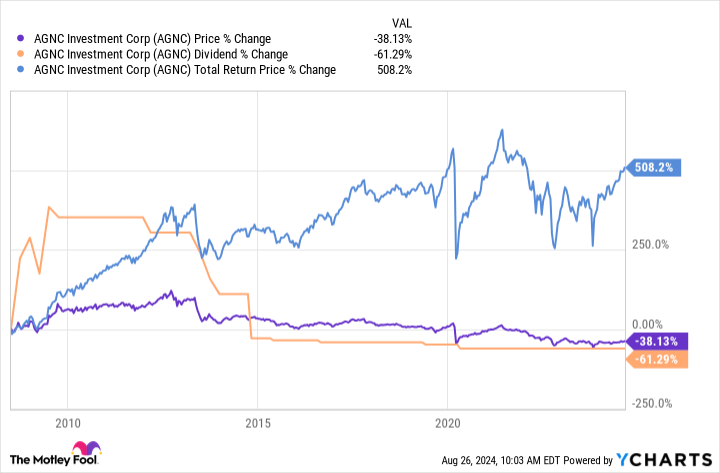If you see a stock with a dividend yield exceeding 14%, you should immediately know you have to dig deeper. That is usually a sign that Wall Street views the investment as risky, which is why most investors will probably be better off avoiding AGNC Investment (NASDAQ: AGNC). But you’ll likely find Realty Income (NYSE: O) and W.P. Carey (NYSE: WPC), both of which have yields just above 5%, much more attractive. Here’s why lower is better here.
The problem with AGNC Investment
Over time, AGNC Investment has done a fairly good job of living up to its goals. The issue is that the goal is total return, not income. As a real estate investment trust (REIT), income is an important component of total return, but the real benefit of the income stream shows up via dividend reinvestment. The chart below is complex, but it highlights the important themes.
The stock price (purple line) has eroded over time. The dividend (orange line) spiked higher initially but has been in a long decline. If you used the dividends you received to pay for living expenses, you would now be left with less income (particularly from the peak level) and less capital. However, if you reinvested the dividends, the total return is more than 500% since the company’s initial public offering (blue line).
So this isn’t really an income stock; it is a total return stock meant for investors that are looking for exposure to mortgage securities (which is what AGNC invests in). Income investors should avoid it and look to stocks with stronger histories of returning value via dividends.
Two net lease REITs for your perusal: Realty Income and W.P. Carey
Net lease REITs own single-tenant properties for which the tenant is responsible for most property-level operating costs. Although any individual property is high risk, across a large portfolio the risk tends to be fairly low. Realty Income is the largest net lease REIT, and W.P. Carey is the second largest.
They share other similarities, as well, most notably on the diversification front. Both companies operate in the U.S. and Europe. And both portfolios include retail and industrial properties. Each of these REITs also spun off their office assets, which is where a big divergence comes into play.
Realty Income managed to spin off its offices without cutting its dividend. It has now increased its dividend annually for nearly 30 years. Add in an investment-grade-rated balance sheet and the size to act as an industry consolidator, and even the most conservative income investors will probably find the stock appealing. The yield is about 5.1%, which is notably higher than the 1.3% on offer from the S&P 500 index and the roughly 3.9% of the average REIT.
A dividend cut came along with W.P. Carey’s office spinoff, which was because of the relatively large size of its investment in the property class and its more modest size as a company. (Realty Income is more than four times larger than W.P. Carey.) But W.P. Carey got right back to increasing its dividend after the cut, which means the cut is probably better viewed as a reset. So although the REIT tarnished its dividend history, it is still prioritizing rewarding dividend investors for sticking around.
The dividend yield, meanwhile, is 5.8%, so you are getting paid more to take on the perceived uncertainty here. Those with a bit more risk tolerance will likely be happy to pick up the extra yield.
Less yield but also less risk
There’s no denying that AGNC Investment has a much more attractive dividend yield than either Realty Income or W.P. Carey. But its dividend history suggests that it is best avoided by investors trying to live off of the income their portfolios generate. Realty Income is a much better option for conservative investors, even after a recent price rally. W.P. Carey, meanwhile, comes with a bit more risk, given the dividend reset, but for those willing to look past a few blemishes, the extra yield could be well worth it.
Should you invest $1,000 in Realty Income right now?
Before you buy stock in Realty Income, consider this:
The Motley Fool Stock Advisor analyst team just identified what they believe are the 10 best stocks for investors to buy now… and Realty Income wasn’t one of them. The 10 stocks that made the cut could produce monster returns in the coming years.
Consider when Nvidia made this list on April 15, 2005… if you invested $1,000 at the time of our recommendation, you’d have $720,542!*
Stock Advisor provides investors with an easy-to-follow blueprint for success, including guidance on building a portfolio, regular updates from analysts, and two new stock picks each month. The Stock Advisor service has more than quadrupled the return of S&P 500 since 2002*.
*Stock Advisor returns as of August 26, 2024
Reuben Gregg Brewer has positions in Realty Income and W.P. Carey. The Motley Fool has positions in and recommends Realty Income. The Motley Fool has a disclosure policy.
2 High-Yield Stocks to Buy Hand Over Fist and 1 to Avoid was originally published by The Motley Fool
EMEA Tribune is not involved in this news article, it is taken from our partners and or from the News Agencies. Copyright and Credit go to the News Agencies, email news@emeatribune.com Follow our WhatsApp verified Channel






